In my role as work futurist and evangelist of open work practices, I spend time in more workplaces than the average bloke (and have the frequent flier miles to prove it). I talk to people up and down the org chart about how they get work done day-to-day, the improvements they’re trying to make, and the challenges they face. What I hear is quite consistent from company to company: we crave more autonomy and meaning in our work.
While many companies are struggling to figure out where to make changes and how quickly, a fair few are on the right track. Moreover, they’re sharing their success stories at conferences, in forums, and on social media. All of which leads me to predict that 2020 is the year we’re going to see these emerging workplace trends go mainstream.
1. The end of “transformation” initiatives
You don’t get to the end of your digital (or agile or cultural) transformation, clap the dust off your hands, and say “Right! Glad that’s all sorted.” Why? Because there is no end. The world changes every day, which means our workplaces have to change every day in order to keep pace. Savvy organizations have discovered that making massive changes in a short period of time is not only messy and painful, it’s also ineffective. If you change too much too soon, people will revert back to the old and familiar (if flawed) ways of working. Gradual, continuous improvement is the best way to bring about long-lasting change, so adopt a growth mindset this year (if you haven’t already) and start with small changes you can build on.
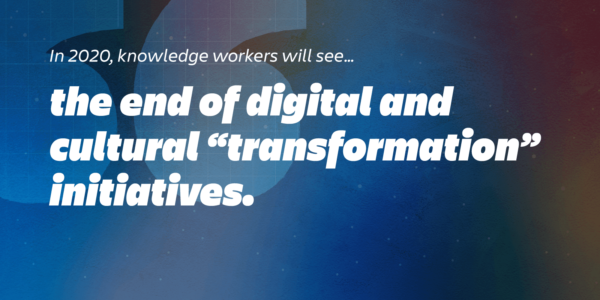
2. Outcomes become more important than output
It’s annoying when you see an announcement from a company about a new product or feature that prattles on about “we worked hard to…” and “we took care to…”. As a customer, I don’t care how hard you worked. I care about whether the feature meets my needs. The same applies inside company walls, and more leaders are catching on. They’re using frameworks like OKRs (objectives and key results) to keep people focused on results, and giving them the autonomy to achieve them in whatever way they think best. Don’t be surprised if you start getting measured on the impact you had and the problems you solved, not just the tasks you completed.

3. Inclusion and belonging become differentiators in the war for talent
Knowledge workers are becoming less and less willing to leave their sense of self at the door when they walk into work. No surprise there! We all want spaces where we can be ourselves and feel like we belong. Why shouldn’t the workplace be one of those spaces? (Within reason, of course…) More job seekers are taking a company’s culture and office vibe into account when deciding which offer to accept or even where to apply: “Will I feel included here? Is this a welcoming environment for women, people of color, and other marginalized groups?”
Competition for talent has already driven salaries and perks sky-high because it’s easy to throw money at the problem. We all know how to do that. Companies that know how to foster a sense of belonging and empowerment are the ones who will stand out to candidates in 2020.
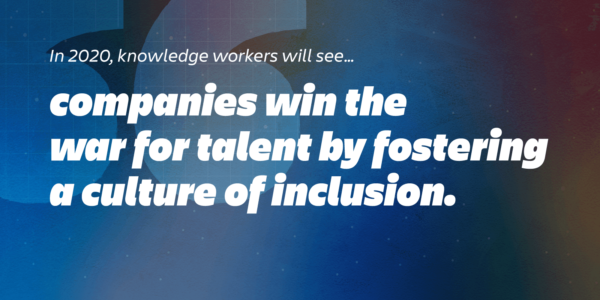
4. Your ability to focus will determine your success
If there’s anything more distracting than the 21st-century workplace, I don’t know what it is. What’s worse, the barrage of pings, emails, and shoulder-taps doesn’t stop when you leave the office. The rise of automation means we humans are freed from mundane tasks so we can tackle meaningful, complex problems. The catch is that, according to research, creative thinking requires blocks of time where our attention is focused. Those who cultivate habits around email, chat, and social media that create space for deep work are the ones who will be most successful.
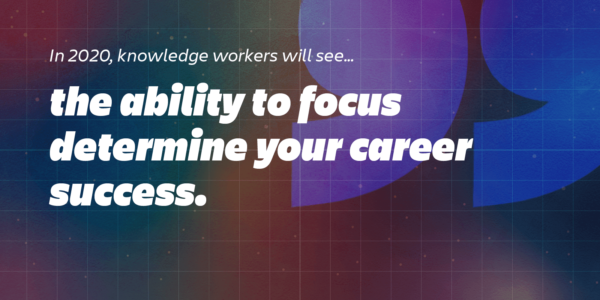
5. Flexibility becomes the norm
The traditional construct of “butts in seats from 9am to 5pm” has been eroding for some time now, and I predict 2020 will be the year it is finally overtaken by common sense. (And by “common sense”, I mean finding better things to worry about than when or where the work gets done.)
Influence over your work schedule has become a critical part of the work-life balance equation. Most parents work, as do their partners, which means somebody has to arrange their work schedule to accommodate school drop-offs and pick kids up from activities on time. Rush “hour” is now three hours long, twice a day. And heaven forbid you should need to be home to sign for a package or let the plumber in. Remote work options and flexible schedules are the cure for what ails modern work. Ride the wave of trends like compressed workweeks or experiment with remote work this year and find your new, more flexible normal.

6. More recognition for accomplishments at the team level
We’re already good at celebrating the accomplishments of individuals and whole companies. Now get ready for the year of the team.
This has been a long time coming, really. Ninety percent of organizations say they’re solving problems so complex they rely on teams to get the job done. Yet those same organizations tend to acknowledge, reward, and performance-manage individuals, not teams. Look: the whole “lone genius” thing is a myth. Thomas Edison had a team behind him working on the light bulb, and Mark Zuckerberg is not a self-taught coder. Companies are bringing more cross-functional and cross-departmental teams together because diverse skill sets and perspectives result in better solutions to tough problems. Atlassian gets this. ANZ Bank gets this. So do Spotify, HubSpot, and Intuit. With more organizations catching on every day, 2020 just might be the year of the team.
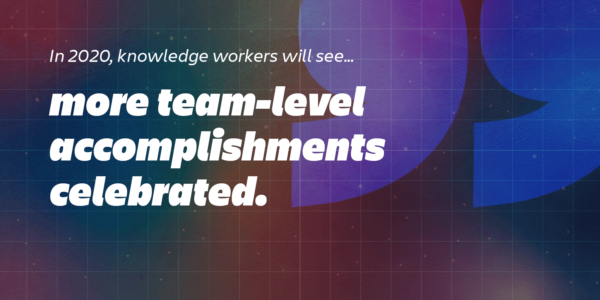
7. The emergence of augmented and virtual reality for building empathy
AR and VR are already being used in myriad ways for onboarding, training, and logistics – mostly in manufacturing and other industrial settings. Now they’re making their way into the office suite. A small number of forward-thinking companies are experimenting with these technologies to combat unconscious bias and create a more inclusive environment. Imagine putting on a VR headset and suddenly being the only woman or person of color at a meeting. We now have the ability to shift our perspective by temporarily adopting the perspective of another person. What a powerful tool to have in our kit. Watch this space.
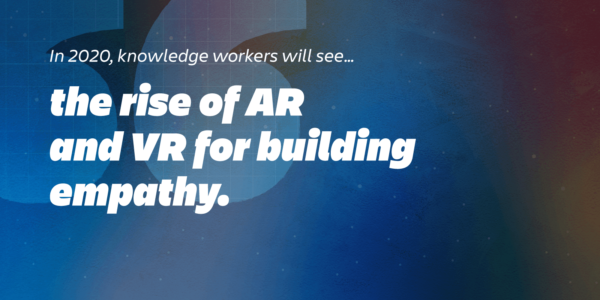
8. Family values make a comeback at work (in a progressive way)
The vast majority of company leaders do indeed value families. And lately, the best of them are actually starting to behave like it. You can see it in many ways (flexible work schedules being one), but I want to highlight one in particular: family leave.
The gender pay gap is real, and we are way overdue on rectifying it. A mounting pile of research shows the “mommy tax” is the prime culprit. Women who have kids, or have the nerve to be of childbearing age, are being overlooked for high-profile (read: high-paying) roles and/or choosing less lucrative, but more flexible, jobs. If the demands of parenthood are the crux of the issue, one way to re-balance the scales is to make sure fathers are sharing the load equally.
To this end, more companies are offering meaningful paternity leave (weeks or even months) so moms can return to work sooner and dads can bond with their children. In fact, Goldman Sachs just announced they are now offering 20 weeks of paid parental leave, regardless of which parent you are. Of course, this only helps level the playing field if both parents actually take that leave, which is trending as well. Also, keep an eye out for “returnship” programs that help parents revive their careers after spending years at home with the kiddos. (And if you don’t care to wait around for your company to take action, this book has some great advice.)
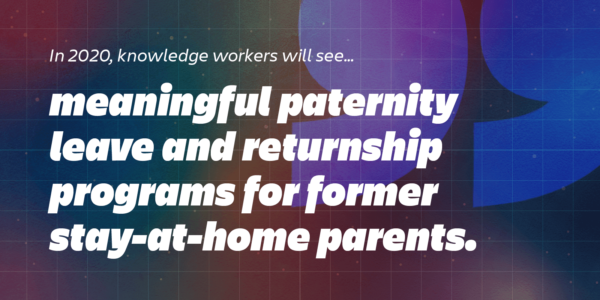
9. Customer empathy takes center stage
Net promoter score (NPS) is a reasonable way to gauge customer sentiment, but you only get to measure after you’ve already taken your product, feature, or service to market. Getting inside customers’ heads before the product is built is the best way to ensure you’re meeting their needs. Besides: customers want to feel you understand them, so listening campaigns earn you a lot of goodwill, as well. If you and your team are new to the customer empathy game, we’ve got primers on customer interviews and contextual inquiries for you in the Atlassian Team Playbook.
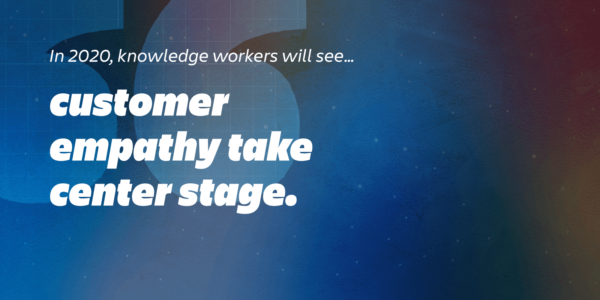
10. A moment of reckoning for “always-on” culture
Can we finally admit that just because you can work all the time from anywhere doesn’t mean you should? It’s simply not healthy, as countless stories of burnout and emotional breakdown prove. Whether through company-developed programs or on a grassroots basis, this is the year we start taking burnout prevention seriously and stop feeling guilty about letting that 8pm email go unanswered until the morning. We need this. We all know it. And we all know why.

Special thanks to Sarah Goff-Dupont for her contribution to this article.





 )
) 




































